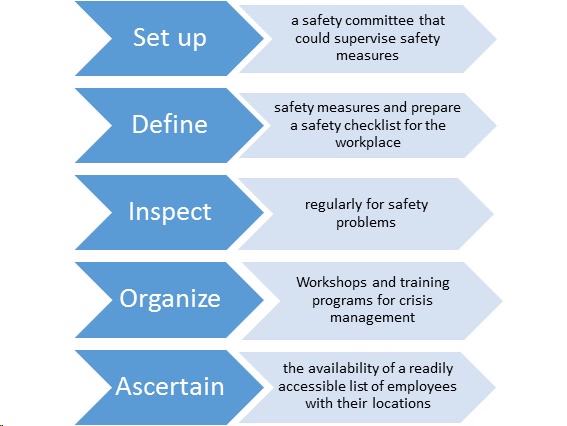In the wake of increasing terror attacks including the recent Paris attack, Mumbai attack (26/11), 9/11 attack or natural calamities such as the Nepal Earthquake; it is imperative for every organization as well as HR departments, across the world, to widen the existing crisis management plans. During such incidents, two major challenges of an HR department include the safety of the workforce and business continuity. Our consultants believe that companies can mitigate the impact of such unforeseen circumstances, with a modern HRMS. Through the following chart, they explain how HRMS can help put in place safety measures and prevent collateral damage.
Expectations from HRMS & HR department during unforeseen calamities
- They should design alternate workflows for emergency situations and enable employees to continue their regular job during terror threats or aftermath of the crisis.
- HR departments should prepare and broadcast a contingency plan (through multiple channels) to assist employees.
- Some employees may get injured during terror attacks. Using HRIS data, HR managers may ask for resources (or remote assistance) from other branches of the company. This may be an effective approach for risk mitigation aka succession planning.
- Nature of the job of some employees may require frequent traveling. Therefore, HR department must set up a travel management program, which is also known as the ‘duty-of-care plan’ in the USA. Unfortunately, a 2010 duty-of-care benchmarking study reveals that less than half of the surveyed companies are monitoring their employees when they travel. In case there is a calamity at the location where an employee has traveled to, HR can take adequate measures – such as informing the local government agency or the family of the employee.
- People may also expect emotional support (including mental health services) from the HR department, during terror attacks.
While a full-proof crisis management plan is key to being able to respond quickly (in-time) and efficiently to a crisis, employee communication is essential to the successful execution of the plan. Social media can help in establishing contact with employees, their families and customers. For example, Facebook’s Safety Check initiative is a great idea.
Greater emphasis on crisis management, post 9/11 terror attack
After the 9/11 attack, Society of Human Resource Management (SHRM) conducted a survey to understand the impact of terror attack on HR practices. According to the survey, 2/3rd of surveyed employers beefed-up security arrangements and almost 1/3rd improved the background check of new hires since the 9/11 incident. The survey includes responses from 408 HR professionals, who were asked: ‘In your opinion, what lasting changes, if any, have taken place in the workplace as a result of the September 11 terrorist attacks?’
Approximately 6 percent respondents stressed upon following changes at the workplace, post 9/11 terror attack:
- Distrust of foreign-born employees.
- Short term changes were made, but not enforced for the long run.
- Employees are more willing to ‘sacrifice’ privacy in exchange for security.
- Significant increase in teamwork.
- More stringent immigration standards and global recruiting curtailed.
HBR study on HR practices, post Mumbai attack (26/11)
During 26/11 terror attack, the way Taj employees’ performed their duty (without any HR manual in place) impressed and inspired everyone. They placed the safety of their guests over their own well-being and in the process, many employees lost their lives. The Harvard Business Review (HBR) studied the outstanding work of Taj employees and published a research paper. The HBR research found three pillars of HR practices that explain the extraordinary courage and actions of employees:
- Unique recruitment system of Taj Group: They look for the character, not just for grades.
- Training programs that not just mentor employees but also empower them to take decisions, and
- A reward program that recognizes employees on a real-time basis.
Conclusion
Remember, we live in a fairly disruptive era and terror attacks may happen anywhere across the world. Therefore, this is the time for HR departments to prepare a contingency plan to handle such unforeseen situations. They may use modern HRMS and start with the review of HR guidelines, procedures and programs specific to crisis management.





